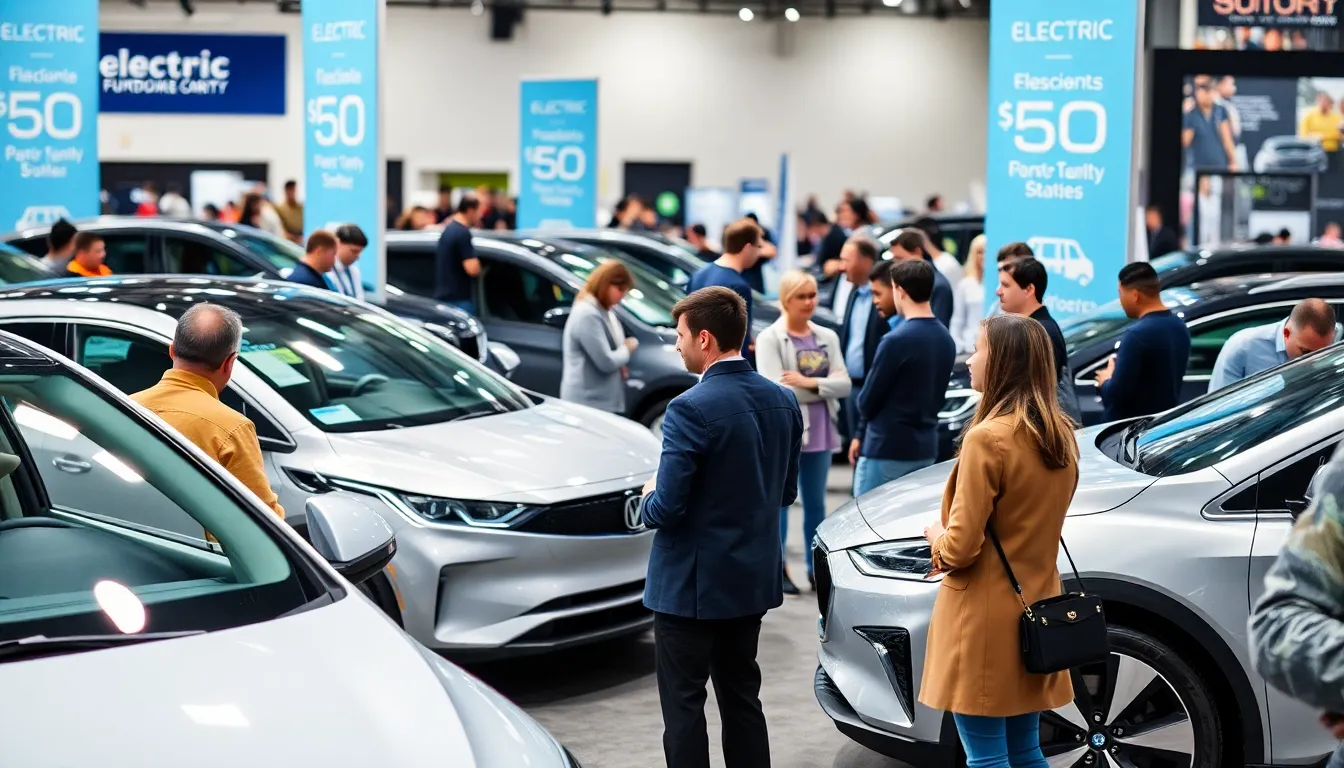Electric vehicles are all the rage these days, but before you trade in your gas guzzler, let’s talk dollars and cents. Sure, the idea of zipping around town in a silent, eco-friendly chariot sounds great, but what’s the real cost? Spoiler alert: it’s not just about the price tag on the shiny new car.
From charging station fees to maintenance costs, the financial landscape of electric vehicles can be as confusing as trying to assemble IKEA furniture without the instructions. Is it really cheaper in the long run? Or will your wallet feel as empty as your gas tank used to? Buckle up as we dive into the nitty-gritty of electric vehicle costs, and find out if going green is worth the green.
Overview of Electric Vehicle Costs
Electric vehicles (EVs) involve multiple cost factors that affect overall ownership. The initial purchase price constitutes a significant portion of these expenses. Average costs for new EVs range from $30,000 to $70,000, depending on make, model, and battery capacity.
Charging infrastructure adds another layer to electric vehicle ownership. Home charging stations typically range from $500 to $2,000, depending on installation complexity. Public charging may incur fees, usually between $0.10 to $0.50 per kilowatt-hour. Costs vary by location and charging network.
Maintenance expenses for EVs often differ compared to gasoline vehicles. Brake systems generally require less frequent servicing due to regenerative braking. Routine maintenance also tends to be lower, with estimates averaging $300 to $500 annually for EVs, compared to $1,000 or more for traditional vehicles.
Insurance premiums also impact total ownership costs. On average, electric car insurance rates are 10% to 20% higher, primarily due to repair costs and vehicle value. Federal and state incentives can mitigate these expenses, providing tax credits that lower initial purchase prices.
Fuel costs for EVs usually fall significantly below those for gasoline vehicles. The average American spends around $1,500 to $3,000 annually on gasoline, while electric vehicle owners may spend $500 to $1,000 on electricity, depending on driving habits.
Resale value impacts long-term costs. Electric vehicles depreciate at rates differing from their gasoline counterparts, often influenced by technology advancements and market demand. Understanding these varying factors helps potential EV owners evaluate the overall economic implications of choosing electric mobility.
Initial Purchase Price

Initial purchase prices for electric vehicles (EVs) vary significantly based on model and features. Average costs range from $30,000 to $70,000, influencing buyer decisions based on budget.
Comparison with Gasoline Vehicles
Electric vehicles often have higher upfront costs compared to gasoline vehicles. The price difference averages between $5,000 and $15,000, driven primarily by the cost of batteries. Battery technology advancements could reduce these discrepancies over time. In contrast, gasoline vehicles typically range from $20,000 to $40,000, with a lower overall price tag enticing many first-time buyers. Long-term savings on fuel and maintenance expenses, however, can offset this initial price gap.
Factors Influencing Price
Several factors impact the purchase price of electric vehicles. Battery size directly affects cost; larger batteries enhance range but increase price. Vehicle brand reputation also plays a role, with established automakers often charging more due to perceived reliability. Features like advanced technology and autonomous driving capabilities can increase expenses as well. State and federal incentives might lower effective purchase prices, encouraging buyers to opt for EVs. Availability of charging infrastructure can also influence buyer confidence and willingness to invest.
Operating Costs
Operating costs represent a significant factor in understanding the affordability of electric vehicles (EVs). These costs encompass fuel expenditures, maintenance, and related fees.
Electricity vs. Gasoline
Electricity generally costs less than gasoline, resulting in substantial savings for EV owners. EV owners spend between $500 and $1,000 annually on electricity, while gasoline vehicle owners face annual fuel costs ranging from $1,500 to $3,000. Factors such as local electricity rates and charging habits can affect these expenses. Public charging stations may charge higher rates, influencing overall costs. Budgeting for electricity versus gasoline shows great potential for long-term savings with EVs.
Maintenance Costs
Maintenance expenses for EVs are often lower than for conventional vehicles. Typical annual maintenance costs for EVs range from $300 to $500, while gasoline vehicle owners frequently encounter higher expenses. Electric vehicles require less maintenance due to fewer moving parts. Brake wear is minimized, thanks to regenerative braking systems. Additionally, many EV manufacturers provide warranties that cover battery issues, reducing long-term financial risks. Overall, the financial implications of maintenance favor electric vehicles.
Incentives and Rebates
Incentives and rebates play a crucial role in reducing the overall costs of electric vehicles (EVs). Federal and state programs provide financial assistance, making the switch to EVs more affordable.
Federal Tax Credits
The federal government offers tax credits to encourage the adoption of electric vehicles. Eligible buyers may receive a tax credit up to $7,500, dependent on the vehicle’s battery size. This incentive lowers the effective purchase price significantly. Notably, manufacturers that exceed 200,000 EV sales experience phase-outs of these credits. Understanding eligibility can maximize savings at tax time.
State and Local Incentives
State and local governments provide various incentives to further lower costs for electric vehicle owners. Many states offer rebates ranging from $1,000 to $5,000 for EV purchases. Some regions also promote grants for home charging stations and public charging infrastructure. Additionally, local tax exemptions or reduced registration fees create further savings opportunities. Evaluating specific incentives enhances the financial outlook for potential EV buyers.
Long-Term Financial Savings
Long-term financial benefits of electric vehicles encompass various aspects beyond initial purchase prices. Owners experience significant savings through reduced operating costs.
Total Cost of Ownership
Total cost of ownership (TCO) includes purchase price, charging, maintenance, and insurance costs. Average purchase prices for new electric vehicles range from $30,000 to $70,000, often exceeding gasoline vehicles by $5,000 to $15,000 due to battery expenses. Maintenance expenses average $300 to $500 annually, significantly lower than gasoline vehicles. Fuel costs for electric vehicles amount to approximately $500 to $1,000 per year, while owners of gasoline vehicles spend around $1,500 to $3,000 annually. Such reductions emphasize the ongoing savings associated with electric vehicle ownership. Incentives like federal tax credits of up to $7,500 also play a crucial role in lowering the overall financial burden.
Resale Value Considerations
Resale value often affects the long-term savings of electric vehicle ownership. Factors influencing resale values include technology advancements and market demand. Battery technology improvements lead to increased vehicle efficiency, positively impacting resale prices. Electric vehicle resale values generally depend on state incentives and consumers’ awareness of operational savings. As the market for used electric vehicles grows, potential buyers face better options, strengthening resale demand. Tracking depreciation trends can assist owners in making informed decisions when selling. Ultimately, understanding these aspects supports better financial planning for electric vehicle owners.
Evaluating the costs of electric vehicles reveals a complex financial landscape. While the initial purchase price may deter some buyers the long-term savings in fuel and maintenance can make EVs a more economical choice. Incentives and rebates further enhance affordability making it essential for potential buyers to explore all available options.
As technology advances and the market for used EVs expands resale values are likely to improve. Understanding these factors can empower consumers to make informed decisions about their investments in electric vehicles. Ultimately the shift toward EVs not only represents a personal financial decision but also a commitment to a more sustainable future.






